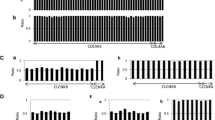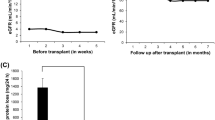Abstract
Background
Recently, comprehensive genetic approaches for steroid-resistant nephrotic syndrome (SRNS) using next-generation sequencing (NGS) have been established, but causative gene mutations could not be detected in almost 70% of SRNS patients. Main reason for the low variant detection rate is that most of them are SRNS caused not by genetic but by immunological factors. But some of them are probably because of the difficulty of detecting copy number variations (CNVs) in causative genes by NGS.
Methods
In this study, we performed two analytical methods of NGS data-dependent pair analysis and custom array comparative genomic hybridization (aCGH) in addition to NGS analysis in an infantile nephrotic syndrome case.
Results
We detected only one known pathogenic heterozygous missense mutation in exon 7 of COQ6 c.782C > T, p.(Pro261Leu) by NGS. With pair analysis, heterozygous exon 1–2 deletion was suspected and was confirmed by custom aCGH. As a result, a small CNV was successfully detected in the COQ6 gene. Because we could detect variants in COQ6 and could start treatment by coenzyme Q10 (CoQ10) in his very early stage of SRNS, the patient achieved complete remission.
Conclusions
These relatively novel methods should be adopted in cases with negative results in gene tests by NGS analysis. Especially, in cases with CoQ10 deficiency, it is possible to delay initiating dialysis by starting treatment at their early stages.



Similar content being viewed by others
References
Sadowski CE, Lovric S, Ashraf S, Pabst WL, Gee HY, Kohl S, et al. A single-gene cause in 29.5% of cases of steroid-resistant nephrotic syndrome. J Am Soc Nephrol. 2015;26(6):1279–89. https://doi.org/10.1681/ASN.2014050489.
Wang F, Zhang Y, Mao J, Yu Z, Yi Z, Yu L, et al. Spectrum of mutations in Chinese children with steroid-resistant nephrotic syndrome. Pediatr Nephrol. 2017. https://doi.org/10.1007/s00467-017-3590-y.
Ogino D, Hashimoto T, Hattori M, Sugawara N, Akioka Y, Tamiya G, et al. Analysis of the genes responsible for steroid-resistant nephrotic syndrome and/or focal segmental glomerulosclerosis in Japanese patients by whole-exome sequencing analysis. J Hum Genet. 2016;61(2):137–41. https://doi.org/10.1038/jhg.2015.122.
Doimo M, Desbats MA, Cerqua C, Cassina M, Trevisson E, Salviati L. Genetics of coenzyme q10 deficiency. Mol Syndromol. 2014;5(3–4):156–62. https://doi.org/10.1159/000362826.
Emma F, Bertini E, Salviati L, Montini G. Renal involvement in mitochondrial cytopathies. Pediatr Nephrol. 2012;27(4):539–50. https://doi.org/10.1007/s00467-011-1926-6.
Desbats MA, Lunardi G, Doimo M, Trevisson E, Salviati L. Genetic bases and clinical manifestations of coenzyme Q10 (CoQ 10) deficiency. J Inherit Metab Dis. 2015;38(1):145–56. https://doi.org/10.1007/s10545-014-9749-9.
Emma F, Montini G, Parikh SM, Salviati L. Mitochondrial dysfunction in inherited renal disease and acute kidney injury. Nat Rev Nephrol. 2016;12:267. https://doi.org/10.1038/nrneph.2015.214.
Quinzii C, Naini A, Salviati L, Trevisson E, Navas P, Dimauro S, et al. A mutation in para-hydroxybenzoate-polyprenyl transferase (COQ2) causes primary coenzyme Q10 deficiency. Am J Hum Genet. 2006;78(2):345–9. https://doi.org/10.1086/500092.
Diomedi-Camassei F, Di Giandomenico S, Santorelli FM, Caridi G, Piemonte F, Montini G, et al. COQ2 nephropathy: a newly described inherited mitochondriopathy with primary renal involvement. J Am Soc Nephrol. 2007;18(10):2773–80. https://doi.org/10.1681/ASN.2006080833.
Ashraf S, Gee HY, Woerner S, Xie LX, Vega-Warner V, Lovric S, et al. ADCK4 mutations promote steroid-resistant nephrotic syndrome through CoQ10 biosynthesis disruption. J Clin Investig. 2013;123(12):5179–89. https://doi.org/10.1172/JCI69000.
Korkmaz E, Lipska-Zietkiewicz BS, Boyer O, Gribouval O, Fourrage C, Tabatabaei M, et al. ADCK4-associated glomerulopathy causes adolescence-onset FSGS. J Am Soc Nephrol. 2016;27(1):63–8. https://doi.org/10.1681/ASN.2014121240.
Girirajan S, Campbell CD, Eichler EE. Human copy number variation and complex genetic disease. Ann Rev Genet. 2011;45:203–26. https://doi.org/10.1146/annurev-genet-102209-163544.
Park E, Ahn YH, Kang HG, Yoo KH, Won NH, Lee KB, et al. COQ6 mutations in children with steroid-resistant focal segmental glomerulosclerosis and sensorineural hearing loss. Am J Kidney Dis. 2017;70(1):139–44. https://doi.org/10.1053/j.ajkd.2016.10.040.
Heeringa SF, Chernin G, Chaki M, Zhou W, Sloan AJ, Ji Z, et al. COQ6 mutations in human patients produce nephrotic syndrome with sensorineural deafness. J Clin Investig. 2011;121(5):2013–24. https://doi.org/10.1172/JCI45693.
Montini G, Malaventura C, Salviati L. Early coenzyme Q10 supplementation in primary coenzyme Q10 deficiency. N Engl J Med. 2008;358(26):2849–50. https://doi.org/10.1056/NEJMc0800582.
Nord AS, Lee M, King MC, Walsh T. Accurate and exact CNV identification from targeted high-throughput sequence data. BMC Genom. 2011;12:184. https://doi.org/10.1186/1471-2164-12-184.
Onsongo G, Baughn LB, Bower M, Henzler C, Schomaker M, Silverstein KA, et al. CNV-RF is a random forest-based copy number variation detection method using next-generation sequencing. J Mol Diagn. 2016;18(6):872–81. https://doi.org/10.1016/j.jmoldx.2016.07.001.
Nagano C, Nozu K, Morisada N, Yazawa M, Ichikawa D, Numasawa K, et al. Detection of copy number variations by pair analysis using next-generation sequencing data in inherited kidney diseases. Clin Exp Nephrol. 2018. https://doi.org/10.1007/s10157-018-1534-x.
Vasson A, Leroux C, Orhant L, Boimard M, Toussaint A, Leroy C, et al. Custom oligonucleotide array-based CGH: a reliable diagnostic tool for detection of exonic copy-number changes in multiple targeted genes. Eur J Hum Genet. 2013;21(9):977–87. https://doi.org/10.1038/ejhg.2012.279.
Acknowledgements
This study was supported by a Grant from the Ministry of Health, Labour and Welfare of Japan for Research on Rare Intractable Diseases in the Kidney and Urinary Tract [H24-nanchitou (nan)-ippan-041 to Kazumoto Iijima] in the “Research on Measures for Intractable Diseases” Project; Grants-in-Aid for Scientific Research (KAKENHI) from the Ministry of Education, Culture, Sports, Science and Technology of Japan (subject ID: 17K16262 to Keita Nakanishi, 15K09691 to Kandai Nozu, and 17H04189 to Kazumoto Iijima); and by Japan Agency for Medical Research and Development AMED under Grant number 7930006 to Kandai Nozu and Kazumoto Iijima. We thank Edanz Group (http://www.edanzediting.com/ac) for editing a draft of this manuscript.
Author information
Authors and Affiliations
Corresponding author
Ethics declarations
Conflict of interest
The authors have nothing to disclose.
Ethical approval
All procedures were reviewed and approved by the Institutional Review Board of Kobe University School of Medicine.
Informed consent
Informed consent was obtained from the patient’s parents.
Additional information
Publisher’s Note
Springer Nature remains neutral with regard to jurisdictional claims in published maps and institutional affiliations.
Electronic supplementary material
Below is the link to the electronic supplementary material.
About this article
Cite this article
Nakanishi, K., Okamoto, T., Nozu, K. et al. Pair analysis and custom array CGH can detect a small copy number variation in COQ6 gene. Clin Exp Nephrol 23, 669–675 (2019). https://doi.org/10.1007/s10157-018-1682-z
Received:
Accepted:
Published:
Issue Date:
DOI: https://doi.org/10.1007/s10157-018-1682-z




